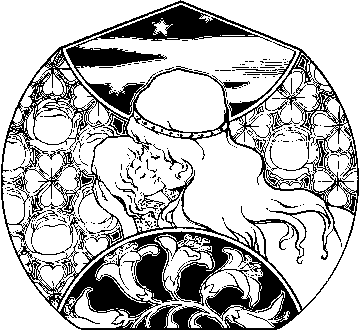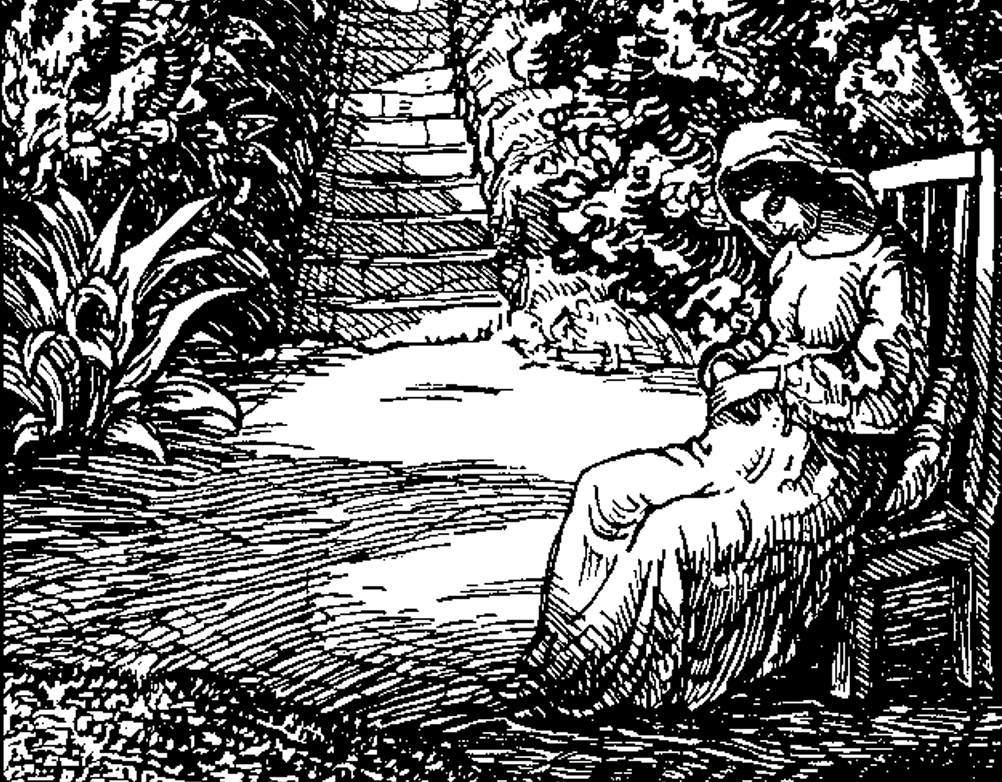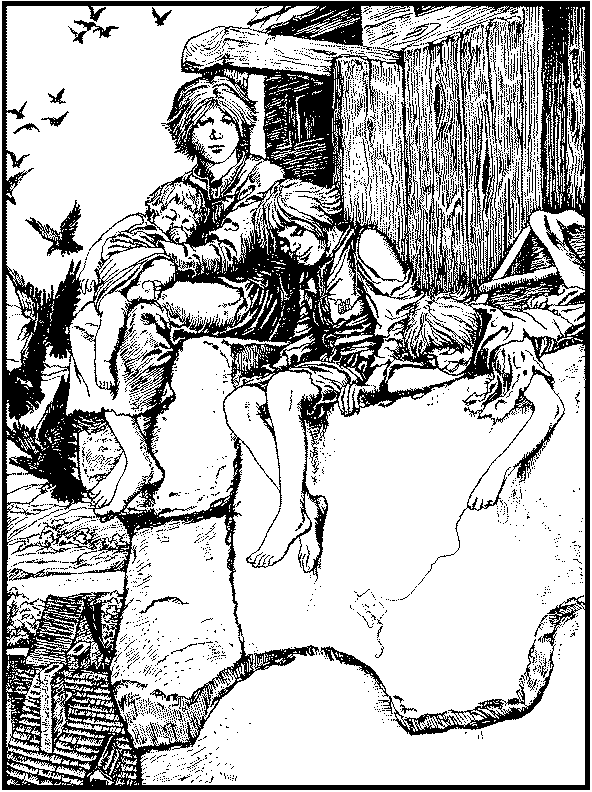"What will you do?" She asked Sigismund quietly.
"What do you mean, what will I do?"
"About the baby. It’s your baby."
"Well," answered Sigismund truthfully, "If it’s a girl, you can do what you like with her. But if it’s a boy…"
Ajda's grip on Sigismund turned into a clutch.
"Oh," he grimaced. "You think I'm going to take him away. My God, woman. You think I would bring such humiliation upon my wife? Make her raise another woman’s son?"
"But he is also your son."
"So he is. If the baby does turn out a boy, you will give him a German name. You will take care of him, and after certain age the boy will be brought up the way I was brought up, trained the way I was trained."
"What do you mean?" She didn't quite understand him.
"I mean, my son will be no peasant. And I prefer to have a bastard than no son at all."
It hurt Ajda, unexpectedly, to hear Sigismund refer to her like that. As a peasant.
"And what should I tell him about his father?"
The steward shrugged. "That is your decision."
"So you will pretend not to know him?"
"For a while, yes. But at the right time, he will know. Why are you looking at me like that, Ajda?"
She couldn't believe it. How casual he was. That this was how it was going to be after everything that had happened, that he had done this to her and now merely saw himself as an adulterer hiding from both his wife and his mistress. After a long, cold silence, she told him, "If this is what you wish, then I want to be left alone. In peace."
To her surprise, there was no argument, no struggle.
"Alright," he said, and left her.
But Sigismund couldn't truly leave her, even though he tried his best at first, believing that the baby required a new diplomacy between them. He thought of Ajda often and longingly, fantasized about the three of them together, mother, father, child. Sometimes he had dreams of waking up to her in the morning, of having her dressed in his wife’s clothes, of servants combing her hair before pinning it up in a barbette. Dreams of her coy smile in his direction from across the banquet table. The two of them walking inside the courtyard, a baby in her arms, suckling at her breast. But then, on the other side of wakefulness, his wife laying next to him, the same long days, now without reward. The more time he spent away from Ajda, the more he behaved like he had when he first met her. The same kind of secretive. He kept his eye on her, his ear to the ground. When she was out working with the other laundresses, their shoulders all rounded from carrying water - and what a pity, he thought, that Ajda's would soon be that way too - he passed by on his horse. He didn't linger, per se, but he passed. Made his presence felt, but not enough to warrant an accusation. Often he stood in the eastern tower observing the women laying out the linens and clothes to dry in the field. He kept track of how Ajda's belly became bigger and rounder. He could pick her out of a crowd just by the lumbering way she walked. It aroused him deeply, the thought of his child growing inside her, taking shape as the combination of their two forms. And yet, as much as he wanted to see her, he kept his distance. He followed his word.
Then, on the last harvest day, the steward came to call on Bodin and his wife. As was the case every year, Ajda walked out of the house to watch the carters load the grain, watched Sigismund have his men round up one of the pigs, watched her uncle pay the steward his accumulated coinage. Not once had Sigismund ever spoken to her at home. When they were embroiled in their arrangement, his ignoring her used to both insult her and come as a source of relief. But this year, he dismounted and walked over to where she stood, in the house's threshold. It was both strange and entirely familiar, seeing him like that, in his full armor, in his role of steward, looking down at her for what she really was. Now they were in their natural circumstances, and she had no choice but to address him with the utmost deference. As he stood before her, she felt the eyes of everyone in her family.
"How is the baby?" he asked.
"Fine, lord steward."
Realizing no kindness would come from her, he had his horse brought over.
"You'll have to pay a new head tax, soon," he told her. As he remounted, he said a word Ajda didn't understand. Siegfried.
She looked at him, confused.
"The name. That's what you will call him. Siegfried."

The thought of hurting the child occurred to Ajda only once, when she was bent over her immense stomach washing, washing, washing in the frigid river. Imagine if it were a son. Imagine the satisfaction that could be had of robbing Sigismund of what he so desperately wanted. But the image she conjured of holding a baby underwater, little bubbles of air dwindling into stillness frightened Ajda so much, she made the opposite vow: to treat the child better than it deserved, to love it as though it were a product of love. And after all, it was her child. It would need her as a mother, love her as a mother, love her, perhaps, when no other being on earth loved her; love her more than anyone. Who was she to refuse God's blessing? After all, wasn't Ajda herself raised and loved by those who chose to do so? After this reckoning, there were no more doubts, no more questions. There was only working and waiting.
The boy was born at night on Shrove Tuesday. He was an easy birth, if there was such a thing, and an easy baby as well. Healthy, strong, alert. Blond like both of his parents, but with green eyes like his mother. Per his father’s request, she called him Siegfried. Sejfrid, it sounded on her lips. That the boy had a German name rankled the noses of Ajda’s peers, who took it as confirmation of everything they suspected of her, from her self-importance to her whoredom. Even her family, who knew the details of her situation, disapproved. Instead, they called him Žiga, which, in their tongue, was also the name of the steward. Ajda hated this. She and her aunt fought mightily over how to address the child. Siegfried was his name, whether anyone liked it or not. And besides, as a baby, he had no knowledge over what was one kind of name and what was another. Mostly she didn't want him being called the same name as Sigismund. Superstitious, she believed that it would lead to the child growing up to be like his father. It became clear early on that no one would truly love Siegfried other than his mother. Many pitied him, but unlike love, pity could be exhausted. Bodin and Marija did their best, but when anyone else in her family took care of him, they did so with such negligence, Ajda preferred to go to the river with him slung on her back even though it made her shoulders ache that much more.
Meanwhile, things grew more concerning outside of Pettau. The fighting on the border escalated, even in winter when men shivered under the weight of their armor. It wasn't uncommon to see garrison men coming and going in groups of five and ten. Even before his son was born, for Sigismund there were bigger things to worry about than babies and mistresses. Sometimes he was on the border, other times in the castle alongside the lord, other times still he was out rousing troops, running supplies, taking stock of arms, paying mercenaries. For the first few months of Siegfried's life, Ajda saw his father only once, riding across the Roman bridge in front of two carthorses full of provisions for the archery towers. Unsure of whether his absence made her feel relieved or uneasy, Ajda tried not to dwell on Sigismund for very long. Instead, she and her son began to form a society of two. She bathed him, changed him, fed him, taught him to walk and speak. The baby made her happy, made her feel less alone. She found herself talking to him freely, even though he couldn’t possibly understand, and when he peered up at her with his big green eyes, when he smiled and cooed and laughed, she loved him beyond comprehension.
In his first year, when her family began reaping the July barley, Ajda became consumed by the thought of Sigismund entering the house and the two, father and son, looking at one another for the first time, up close. I hope it hurts, she thought, I hope it kills you. That’s your boy, you fool. He even looks like you. But when the steward came to call, he did so as usual - only in the fields, omitting the house altogether. And from the threshold, baby in her arms, she watched him ride away, thinking, you coward. You utter coward. However, when the winter came, so too, clandestinely, did the steward’s men in the middle of the night, with food and wood and wool blankets. Ajda, at first upset, later inwardly accepted the gifts owing to the unusual brutality of the winter. Snow piled halfway up the door. Many thatched roofs collapsed, and a few village children died of starvation. Burying them proved difficult as the ground was frozen solid. Those who lived in small households combined them so as to all sleep together and keep warm. Christmas came leanly, as many animals froze to death. Bodin kept his chickens in the house. Some nights, he even brought the pigs in, which was a sight to see.
That same, first winter, the lord died. Rumor had it that he was out riding along the border one day in the terrible cold and snow and collapsed from frostbite and exhaustion. No one could revive him. It took too long to get back into town. In what seemed like a pageant of miracles, the Archbishop and his dazzling menagerie came down from Salzburg to intervene, so as to prevent war between the Empire and Hungary. For years afterwards, Pettau was without a lord, as the lord’s eldest son Frederick remained in Graz serving first as a page, later a squire. The elusive lady, Benedicta, ruled alone. Some in those parts say these years were easier, as the Hungarians had relaxed now that their chief antagonist had perished. Others say that without a lord to keep them in check, men like Sigismund were permitted to act with too much freedom. Other taxes went down, but, in compensation, the head tax had never been higher.
And so the first few years of Siegfried’s life passed. When it became clear that the child would survive infancy, the gifts in the night ceased. As soon as the boy came into his own sense of self, burst into language, anyone with eyes could see that he possessed an almost insouciant brightness. He learned quickly, and asked questions. Difficult ones. Why? Why can't we see God? Why do some people live in the castle and others in the fields? Why do we have to give away what we grow ourselves? Why do ladies wear dresses and men wear braies? Why do people die? When, while still very young, he asked his mother: who is my father? His mother replied, "Nobody. You see, you are like me. I didn’t have a father either." Everyone tried to answer the boy's questions best they could, but it was never enough for him. "I regret ever teaching him that word 'why'," his aunt used to mutter. Bodin, however, noticed that Siegfried seemed to be better placated when the answer to his question came in the form of a story. When Siegfried once asked him, "Uncle, why do we grow wheat?" Instead of saying, simply, "to eat," Bodin told him a tale he remembered from his own father.
A long time ago, there was no wheat anywhere along the Drava river. Not here in Ptuj, nor upstream closer to what the Germans call the Jauntal. When the people here tried to grow it with seeds bought from Carinthia, the seeds shriveled up or became moldy. There weren't so many people here in those days, in part because they all hungered for bread, and the traveling merchants charged them a pretty pfennig for it. Think of how much bread and pottage you eat, little one. Do you think we could survive on vegetables and meat alone? Anyway, one day, the town fisherman sat on the banks and spoke to the Drava. He said to the river, I have grown old and tired. I have pledged myself to your waters and you have, in turn, been very good to me. My nets have always been plentiful, and I have not only fed others but have made quite a fortune for myself. I live in a fine house with my wife, and my sons are well-fed and have wives of their own. Is there any possible way I can repay you?
The Drava said to the man, "Travel widely throughout the world, see all the things that can be seen. One day you will come to a place far from here where people grow wheat, barley, and rye in fields as far as the eye can see. Go into the town and buy a loaf of bread made with each, and then bring them back to me."
The fisherman packed up his horse with provisions, kissed his wife, and then set off. They say he went all the way to Celovec, Bavaria, even to France. Finally, he found a merchant selling each of the three loaves and brought them back to the Drava. As soon as the bread touched the water, the river swelled and flooded the plains, soaked the soil and drew the attention of thousands of birds - storks and swifts, geese and songbirds. The sky burst into music. And then, when the water receded, to the amazement of everyone in the town, little sprouts of wheat, rye and barley, emerged from the soil. And that's why we grow all three here.




